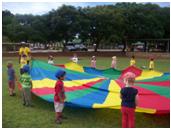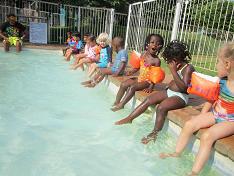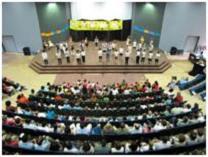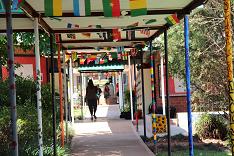 < Back to Leadership Vacancies
< Back to Leadership Vacancies
Appointed - Russell Menard
Apr 15, 2015
May 6, 2015
The American International School of Lusaka (AISL)
Lusaka, Zambia
seeks a
Director
To begin July 2016
AISL Vision and Mission:
Inspiring Excellence. Encouraging Compassion. Creating Leaders.

The American International School of Lusaka is a diverse community that embraces Zambian and global perspectives to inspire students to achieve academic excellence and become successful, lifelong learners and leaders who are confident, compassionate, well--rounded, responsible world citizens.
School Profile
The American International School of Lusaka (AISL) is a co--educational independent day school founded in 1986. AISL is an US--Embassy sponsored school that is governed by a seven member Board of Directors representing parents, all of whom are members of the AISL Parent Association. The Director is responsible only to the Board and only through official action by the Board in session. The General Assembly of the Association meets once a year in September.
Accredited by the Council of International Schools and the Middle States Association of Schools and Colleges, AISL serves children of expatriate and Zambian families. Students’ families are employed in the diplomatic, NGO, local business, farming, mining and tourism industries.
As an IB World School, AISL is authorized by the International Baccalaureate Organization to administer the IB Primary Years Programme (Pre-School-- Gr. 5), the IB Middle Years Programme (Grades 6--10), and the IB Diploma Programme (Grades 11&12). Grade 11-12 students may select from a range of IB certificates and may earn a US accredited High School Diploma.

AISL consists of a Primary School and a Secondary School each with a principal, a part-time assistant principal, and part-time IB coordinators (IB PYP, IB MYP, IB Dip) serving as the instructional leader. AISL is an active member of the Association of International Schools in Africa (AISA).
The academic year includes a minimum of 180 instructional days in two semesters. The first semester begins in early August and ends in mid-January. Semester II begins in mid-January and continues until early June, closely following the North American school calendar.
Students
AISL is proud of its international student body enrolling 580 students who are 3--18 years of age representing over 46 different nationalities. Currently, 301 students are enrolled in the Primary School (Early Learning Center and Kindergarten–Grade 5), while 279 students are enrolled in the Secondary School (Grades 6--12).
Faculty, Administration, and Staff
Currently, 69 faculty members representing 16 different nationalities serve the AISL school community. AISL is fortunate to have a long--serving and deeply committed administrative staff, teacher assistants, and support staff.
 The structure of leadership at the school consists of the educational leadership team (director, the primary and secondary principals and three IB Coordinators) and the operations leadership team (director, the primary and secondary principals, the business manager, the admissions/ communications manager, the operations/security manager, and the information technology manager). A shared leadership model (coordinators, department heads, special assignments, etc.) is employed throughout the school.
The structure of leadership at the school consists of the educational leadership team (director, the primary and secondary principals and three IB Coordinators) and the operations leadership team (director, the primary and secondary principals, the business manager, the admissions/ communications manager, the operations/security manager, and the information technology manager). A shared leadership model (coordinators, department heads, special assignments, etc.) is employed throughout the school.
Facilities:
AISL has world--class facilities located on 23 acres of beautifully manicured gardens in the African countryside. The facility includes 48 classrooms, 3 swimming pools, a Performing Arts Center, 3 computer labs, an Early Learning Center, a full size Gymnasium, and newly constructed Secondary School Science Labs.
Lusaka, Zambia
 Lusaka is the capital and largest city of Zambia. One of the fastest--developing cities in Southern Africa, Lusaka is located in the southern part of the central plateau at an elevation of about 1,300 metres (4,265 feet). As of 2010, the city's population is about 1.7 million. Lusaka is the centre of both commerce and government in Zambia. Zambia has experienced political stability for the past two decades. English is the official language of the city, but Nyanja, and Bemba are also common.
Lusaka is the capital and largest city of Zambia. One of the fastest--developing cities in Southern Africa, Lusaka is located in the southern part of the central plateau at an elevation of about 1,300 metres (4,265 feet). As of 2010, the city's population is about 1.7 million. Lusaka is the centre of both commerce and government in Zambia. Zambia has experienced political stability for the past two decades. English is the official language of the city, but Nyanja, and Bemba are also common.
It’s a great place for younger children to grow up and there are lots of outdoor activities, particularly sports - mountain biking, horse riding (including Polo), golf, etc.
If you’re out to experience the ‘real’ Africa, Zambia is that diamond in the rough. The country boasts some of the continent’s best safari parks, and shares (with Zimbabwe) some of the region’s major highlights: Victoria Falls in Southwestern Zambia, Lake Kariba as well as Lower Zambezi National Park in Southeastern Zambia. It is also an angler’s dream, as fishermen hail from all over the world to try their luck on the mighty Zambezi River with the hopes of landing a toothy tigerfish or the rare, giant vundu. Avid birders also flock to Zambia to glimpse its fabulous diversity of birds, most notably Chaplin’s barbets.
In all of its natural beauty, Zambia is still a part of the developing world and with that comes challenges. Lusaka is fast developing into a city with many modern amenities - shopping centers, supermarkets, department stores, movie theatres, etc. However, you will also need to be prepared for occasional power cuts, water shortages, and an inconsistent Internet connection.
Quality primary health care is readily accessible. AISL provides professional educators with a membership to a local international standard clinic, an international healthcare policy (TIE), and medical evacuation insurance.
As a general guide, professional educators live in comfortable housing, own a vehicle, travel widely and stay for a quite a few years.
The position: School Director
As Chief Executive officer of the school, the Director is expected to exert leadership in all areas related to the academic program and the management of the school. The authorities and duties of the Director General are enumerated in Board policies. He/she is responsible for managing the school in accordance with sound principles of curriculum and educational instruction, communications, business and financial management, and organizational development. He/she takes part in all Board meetings, except when specifically excluded, and has a voice but no vote. The Director is the chief advisor to the Board of Directors in all policy-level matters, not just in those related to academic questions.
 The Director is empowered by the Board to administer the approved policies of the American International School of Lusaka (AISL). In the absence of policy, or in an emergency, the Director acts in accordance with sound educational or organizational principles, but must bring such actions to the attention of the Board at the earliest possible time. The Board understands the different roles of the Board and administration, and that it is the duty of the Director to manage the day-to-day operations of the school.
The Director is empowered by the Board to administer the approved policies of the American International School of Lusaka (AISL). In the absence of policy, or in an emergency, the Director acts in accordance with sound educational or organizational principles, but must bring such actions to the attention of the Board at the earliest possible time. The Board understands the different roles of the Board and administration, and that it is the duty of the Director to manage the day-to-day operations of the school.
Qualifications / Experience:
The preferred director will have the following minimum qualifications and experience:
- Graduate Degree (Masters, Ed.D, or Ph.D)
- Knowledge and understanding of all three IB Programmes
- Extensive experience in education, management, and leadership
- Experience working with International Baccalaureate programs
- Experience in recruitment, personnel management, budget and finance, and working with school boards
- Communication and public relations skills
- Experience overseeing school building projects
- Ability to think and plan strategically
- Demonstrated experience in successfully managing change
Job Goal:
It is the Director’s responsibility to provide visionary leadership and demonstrate exemplary strategic thinking and management skills in the recruitment and development of faculty and staff, the implementation of a high standard curriculum, the assurance of long-term school financial stability, and the provision of effective communication with all of the school’s constituents.
Performance Responsibilities:
The Director is responsible for all programs on campus, including development, revision, oversight, and evaluation. S/he will strengthen and maintain the current school policies and procedures. S/he is responsible to ensure the continued accreditation of the school (last reviewed 2015) as well as ensuring the safety and security of the school community while on campus. Specifically, the Director is responsible for the following:
Academic
- Set the academic vision and ensure alignment with overall school vision and strategy.
- Establish and maintain academic and accreditation standards.
- Provide for the review, development, monitoring, and evaluation of the school’s curriculum.
- Employ academic indicators to evaluate the schools performance against standards.
- Develop and oversee the implementation of corrective action plans to address areas where performance does not meet standards.
- Ensure that leading edge educational thought and best practices are sought out and implemented where applicable.
Human Resource Management
- Recruit, appoint, assign, develop, manage, and terminate the employment of both instructional and non-instructional personnel.
- Organize personnel in a manner that best serves the school.
- Maintain positive school and staff relations by developing sound personnel practices, delegating work properly, and implementing procedures for staff evaluation.
- Work with personnel to develop a corrective action plan when performance does not meet standards.
- Pro-actively supports professional growth and development for all staff.
Fiscal Management
- Oversee the development of an annual budget for Board approval by following a collaborative fiscal planning process.
- Monitor on-going income and expenditures against approved budget and communicate substantive deviations to the Board.
- Ensure sound fiscal practices and efficient and effective allocation of resources to every aspect of the operation of the school.
- Ensure compliance with reserves management target.
- Ensure long-term financial planning (LTFP) including updating the LTFP.
Facilities Management

- Develop and maintain an on-going facility usage/development plan that supports and enhances the academic program.
- Ensure that the physical plant is properly maintained and appropriately developed.
- Provide a safe and secure environment for all teachers, students, and staff.
- Maintain an appropriate record/data base.
- Ensure effective delivery of the newly developed master site plan.
Communication and Community Relations
- Promote effective communication with faculty/staff, students, and parents to creative a positive and inclusive school environment.
- Promote the school locally, nationally, and internationally.
- Foster a positive relationship with the host government and the national and international business, diplomatic, and educational communities.
- Foster a positive working relationship with the Board Chair and the Board of Directors.
Governance- Strategy and Policy
- Keep the Board of Directors informed of the condition of the school’s educational system; advise the Board on educational issues.
- Develop the agenda for regular Board meetings in consultation with the Board Chair.
- Attend all Board meetings, except meetings pertaining to the Director’s performance.
- Regularly review and update the strategic plan.
- Oversee the implementation of the strategic plan and work with the Board to regularly assess the plan to meet the school’s future needs.
- Ensure that school policies are effectively implemented and monitored and identify policies in need of change or development.
Other

- Perform other duties and responsibilities consistent with those normally associated with the position of School Director.
Performance Evaluation
The AISL Board of Directors will evaluate the job performance of the Director annually in accordance with procedures outlined in contract and AISL Board Policy.
Compensation and Benefits
AISL offers an initial contract term of three years (renewable). The remuneration package is commensurate with the responsibilities of the position and is competitive within Africa. Benefits include housing, utilities, use of a school vehicle, comprehensive health insurance, retirement contribution, professional development allowance, annual home leave, transportation at the beginning and end of contract, a shipping allowance, and tuition benefits at AISL for school age dependents.
Application Procedure
The AISL School Board would ideally like to make an early appointment by June 2015; however, it is recognized that some potential candidates may not decide until later in the summer if they will leave their current school. Therefore, two application deadlines have been set:
By May 6, 2015, an initial long list will be reviewed by the school board, to decide if there is a sufficient pool of candidates able to interview in Lusaka during the week of May 18. If not, then –
Applications will continue to be accepted through August 15, 2015, with on-site interviews of finalists scheduled later in September.
The review of files will begin as soon as applications are received. Search Associates will select semi-finalists, and the Director Search Committee will invite 2-3 finalists to AISL to interview and meet with stakeholders in the community. The Search Committee will make an appointment either in May, or in September 2015.
Candidates should note that, in the event an outstanding applicant is identified early in the search process, AISL reserves the right to make an appointment at any time, even before the deadlines mentioned above. For this reason interested candidates are encouraged to apply at the earliest possible time.
Applicants should send the following in single pdf file. Total document size should not exceed 4MB, if possible.
- A letter of application, explaining your strengths as a candidate and why you are interested in the position of School Director at the American International School of Lusaka, not to exceed two pages.
- A statement describing your leadership style, not to exceed one page.
- A current résumé not to exceed two pages.
- A one--page list of 3-5 references with current addresses, phone numbers and email addresses, including the Board Chair and Treasurer at your current school.
- A maximum of three letters of reference (scanned at low resolution) that may already be in your possession
Applications should be emailed to:
Ralph Jahr - < rjahr@searchassociates.com > and
Jim Ambrose - < jambrose@searchassociates.com >
Additional information about AISL can be found on the school’s website at www.aislusaka.org.
Consultant’s Comments
A few years ago, a previous Head of AISL wrote “It is a gem of a school in Africa, with a strong culture of learning, in a safe, friendly and peaceful country” and that remains true today. AISL is a well-run school and has just gone through the CIS reaccreditation process, with a positive report expected soon.
A new master plan for campus development will be completed soon and construction projects are expected to consume a major portion of the new Director’s time, indicating a need for experience with such projects in developing countries and energy to be in the field getting their feet muddy to know what’s going on.
Technologically, AISL is a very progressive school and has one of the largest Apple Mac IPAD installations in Southern Africa. AISL is also a regional IB training center.
AISL has developed strong connections to the broader Zambian community through the use of unique facilities (430-seat theatre, full-size gym, two 25 meter swimming pools), as well as through an extensive community service program.
Ralph Jahr and Jim Ambrose
